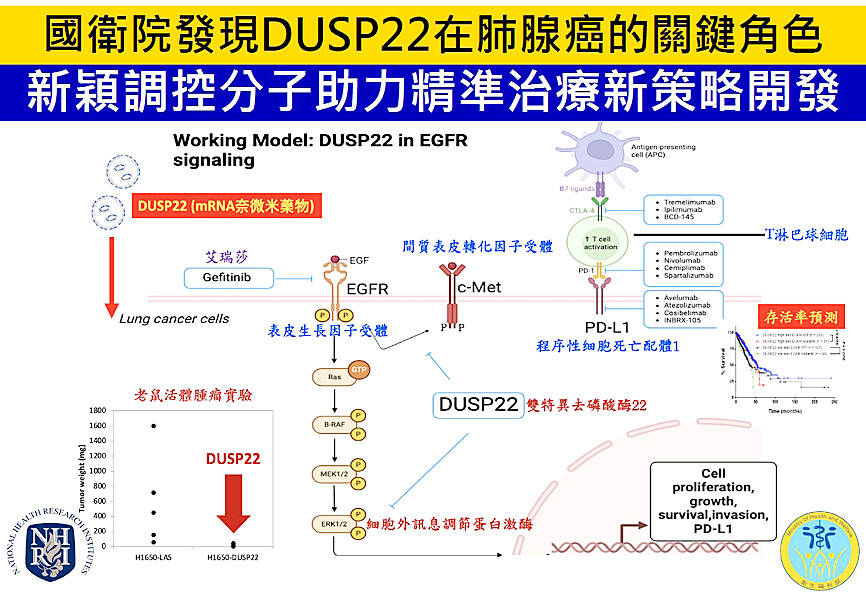Taiwanese researchers have linked higher survival rates and decreased tumor spread in patients with adenocarcinoma of the lung to a gene, the National Health Research Institute said on Friday.
This research clarifies the mechanism of lung adenocarcinoma’s spread and has implications for cancer treatment, it said.
Adenocarcinoma of the lung accounted for 40 percent to 50 percent of all cases of lung cancer, the most prevalent cause of death in Taiwan, according to government data.

Photo courtesy of the National Health Research Institute
A study led by institute associate investigator Lin Wen-jye (林文傑) discovered via bioinformatics that the expression of the DUSP22 gene is linked to better outcomes for lung adenocarcinoma patients, the institute said.
The research team drew on US-based studies on the genetic lineage of cancer cells, it said.
The DUSP22 gene encodes dual specificity protein phosphatase 22, an enzyme that plays a key role in regulating epidermal growth factor receptors (EGFR) and the downstream extracellular signal-regulated kinases pathways in lung adenocarcinoma cells, it said.
This means cancer cells lacking the gene’s expression are susceptible to tyrosine kinase inhibitors affecting the EGFR, pointing to new possibilities for targeted therapy, it said.
DUSP22 expression could potentially be applied to predict tumor severity and its responsiveness to treatments, allowing doctors to strategize treatment plans more effectively, it said.
The research could also open new doors to future studies into the role the DUSP22 gene plays in cancer cell drug resistance, microenvironment and metastasis, the institute said.
The research team’s findings deepened scientific understanding of mechanisms enabling lung adenocarcinoma progression and opened new doors to potential therapeutic approaches, it said.
The study was published in Cell Death Discovery in July last year, the institute said.

The inspection equipment and data transmission system for new robotic dogs that Taipei is planning to use for sidewalk patrols were developed by a Taiwanese company, the city’s New Construction Office said today, dismissing concerns that the China-made robots could pose a security risk. The city is bringing in smart robotic dogs to help with sidewalk inspections, Taipei Deputy Mayor Lee Ssu-chuan (李四川) said on Facebook. Equipped with a panoramic surveillance system, the robots would be able to automatically flag problems and easily navigate narrow sidewalks, making inspections faster and more accurate, Lee said. By collecting more accurate data, they would help Taipei

STATS: Taiwan’s average life expectancy of 80.77 years was lower than that of Japan, Singapore and South Korea, but higher than in China, Malaysia and Indonesia Taiwan’s average life expectancy last year increased to 80.77 years, but was still not back to its pre-COVID-19 pandemic peak of 81.32 years in 2020, the Ministry of the Interior said yesterday. The average life expectancy last year increased the 0.54 years from 2023, the ministry said in a statement. For men and women, the average life expectancy last year was 77.42 years and 84.30 years respectively, up 0.48 years and 0.56 years from the previous year. Taiwan’s average life expectancy peaked at 81.32 years in 2020, as the nation was relatively unaffected by the pandemic that year. The metric

TAKING STOCK: The USMC is rebuilding a once-abandoned airfield in Palau to support large-scale ground operations as China’s missile range grows, Naval News reported The US Marine Corps (USMC) is considering new sites for stockpiling equipment in the West Pacific to harden military supply chains and enhance mobility across the Indo-Pacific region, US-based Naval News reported on Saturday. The proposed sites in Palau — one of Taiwan’s diplomatic allies — and Australia would enable a “rapid standup of stored equipment within a year” of the program’s approval, the report said, citing documents published by the USMC last month. In Palau, the service is rebuilding a formerly abandoned World War II-era airfield and establishing ancillary structures to support large-scale ground operations “as China’s missile range and magazine

A 72-year-old man in Kaohsiung was sentenced to 40 days in jail after he was found having sex with a 67-year-old woman under a slide in a public park on Sunday afternoon. At 3pm on Sunday, a mother surnamed Liang (梁) was with her child at a neighborhood park when they found the man, surnamed Tsai (蔡), and woman, surnamed Huang (黃), underneath the slide. Liang took her child away from the scene, took photographs of the two and called the police, who arrived and arrested the couple. During questioning, Tsai told police that he had met Huang that day and offered to